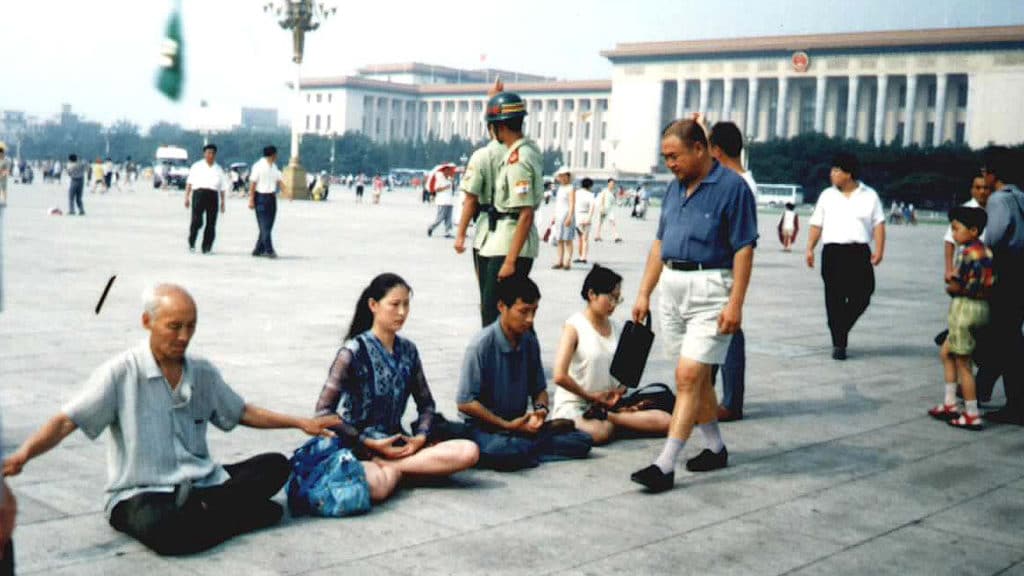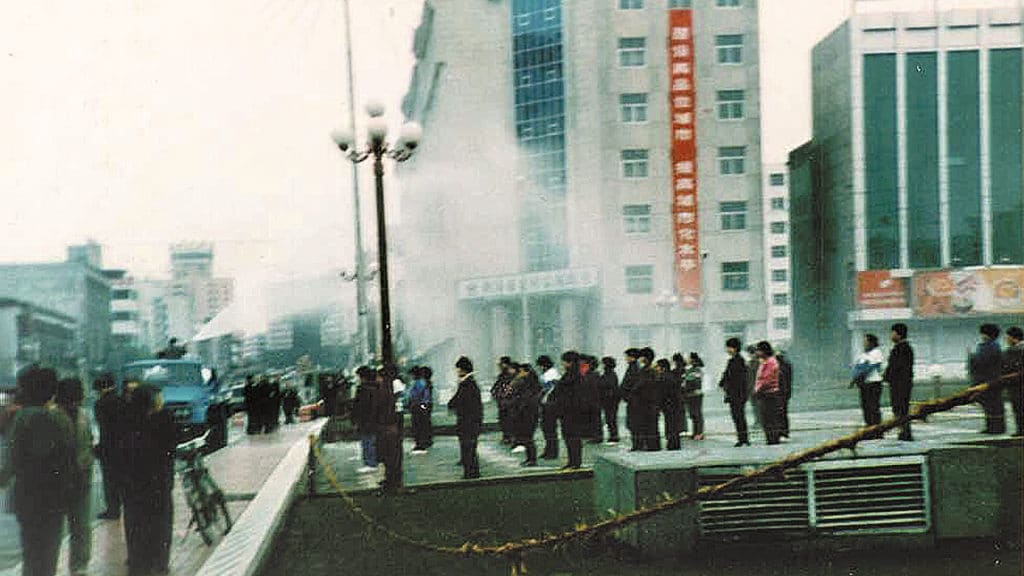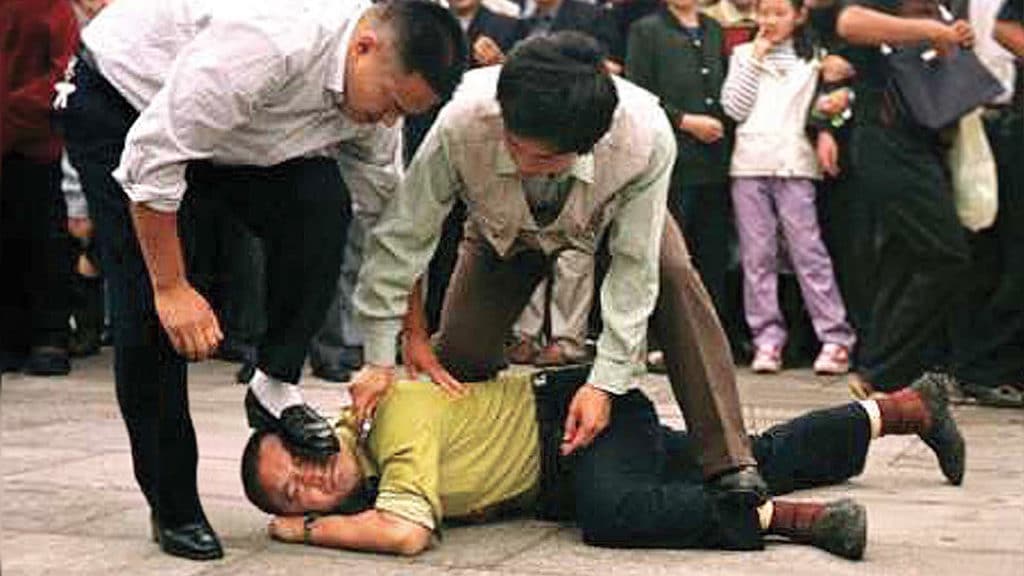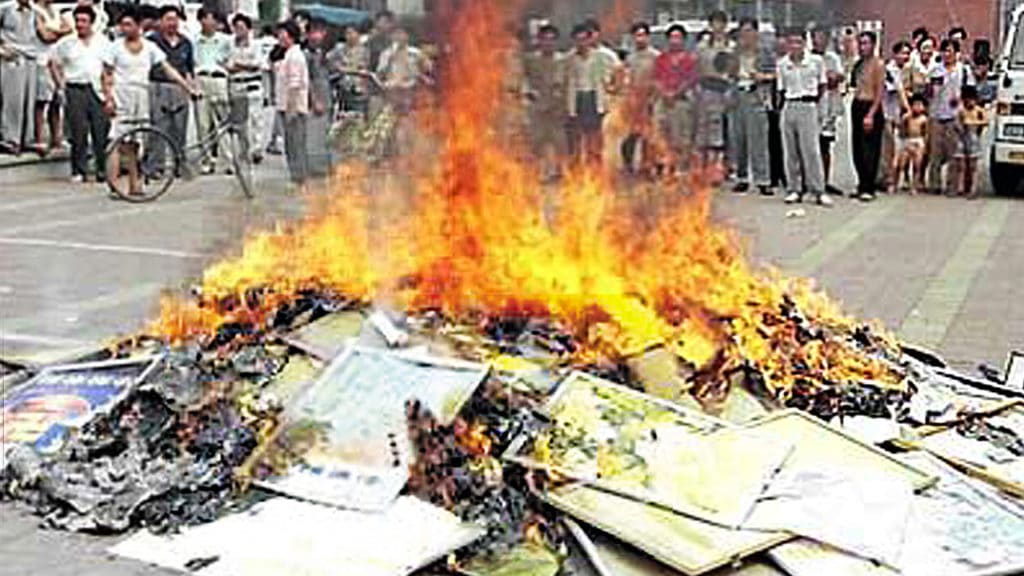
Eve of Persecution
Upon its initial public dissemination in China beginning in May of 1992, Falun Gong was one of many qigong groups registered with the China Qigong Research Association, a government entity. For several years, the practice enjoyed official acceptance and even encouragement.
Falun Gong seminars were held in the Hero’s People’s Hall, and in Chinese embassies from Paris to New York. A number of government and Chinese Communist Party (CCP) officials took up the practice.
March of 1996 • Falun Gong withdrew from the Qigong Association as it refused to charge money for the practice per the association’s requests and wished to exercise autonomy from government or CCP interference.

Almost immediately thereafter, articles critical of Falun Gong began appearing in local-level CCP-controlled media outlets. The Public Security Bureau began monitoring Falun Gong adherents, and Falun Gong books (by this time national best-sellers) were banned from further publication. Although the practice continued to grow, with an estimated 70 million adherents by 1998, the harassment and surveillance of practitioners also escalated.
In April 1999, an article appeared in Tianjin city deriding Falun Gong. The article was authored by the brother-in-law of China’s public security bureau chief and member of the CCP’s powerful Politburo Standing Committee, Luo Gan.
From April 19–24, Falun Gong practitioners held sit-ins outside the newspaper’s office to request a retraction, a lawful tactic that had prompted retractions in similar isolated incidents that had arisen elsewhere in China in the late 1990s. This time, however, the Public Security Bureau of Tianjin dispatched riot police to beat up the Falun Gong practitioners who had come to appeal, resulting in injuries to the practitioners. The police arrested 45 people.
When Falun Gong practitioners requested the release of those detained, they were told that the police acted upon instructions from Beijing, and that the arrested practitioners would not be released without authorization from Beijing. The Tianjin police suggested to Falun Gong practitioners that if they wanted to petition, they must go to the capital: “Only going to Beijing can resolve the problem.”

On April 25, Falun Gong practitioners gathered at the central appeals office in Beijing to request that the harassment of practitioners and restrictions on publishing Falun Gong teachings end and that the unlawfully detained practitioners be released. The gathering was peaceful and orderly. That evening, the concerns of Falun Gong practitioners were heard, the arrested practitioners in Tianjin were released, and everyone went home.
Why It Matters: The CCP misrepresented the April 25th gathering as a “siege” of the central government compound, and thus politicized Falun Gong, both in China and abroad. Even though Falun Gong is a completely apolitical self-improvement practice, the CCP started to push a narrative that Falun Gong was vying for power with the Communist Party.
On April 25th, 10,000-20,000 Falun Gong adherents gathered peacefully outside the government’s central appeals office, and were directed by security forces to assemble immediately outside the Zhongnanhai central government compound.
Several Falun Gong adherents met with then-Premier Zhu Rongji and other top leaders to request that the harassment and restrictions on publishing Falun Gong teachings end and that the Tianjin practitioners be released. Zhu assured those present that the Party was not opposed to Falun Gong, and agreed to the release of the detained practitioners. At dusk, Tianjin released all of the detained Falun Gong practitioners in accordance with instructions from the central government.
Angered Jiang Zemin: The Communist Party Must Eradicate Falun Gong
Then-Party leader Jiang Zemin responded to the demonstration very differently. He was reportedly angered that Falun Gong adherents had staged such a large demonstration outside the government compound, was disturbed by the size and independence of the practice, and viewed its moral philosophy as incompatible with the Party’s atheism.
Jiang resolved that evening that the Communist Party must eradicate Falun Gong—a religion with at least as many adherents as there were Party members.
The CCP subsequently began widespread and coordinated attacks against Falun Gong practitioners.
According to journalistic accounts, the decision appeared to be primarily that of Jiang Zemin, then head of the CCP. Sources cited by the Washington Post, for instance, stated that, “Jiang Zemin alone decided that Falun Gong must be eliminated,” and “picked what he thought was an easy target.” Some analysts speculated that the ban against Falun Gong was largely motivated by Jiang’s desire to consolidate political power within the Politburo of the CCP. Others have explained it as being due to Jiang and other top leaders regarding Falun Gong as antithetical to the Party’s asserted atheism and as a threat to its ideological hegemony in China. After all, maintaining a regime largely through corruption, violence, and personal favors is made difficult when a large percentage of the population wholeheartedly embraces truthfulness, compassion, and tolerance as principles to live by.

Throughout the spring of 1999, a series of events unfolded, culminating in the full-scale crackdown launched on July 20th. In late April, a letter by Jiang Zemin was circulated among key Party leadership with instructions to study and implement his directives. The letter characterized Falun Gong as a state enemy, which must be monitored and controlled to protect the safety of the CCP. A May 1999 memorandum making similar points was subsequently circulated to Party members across China.
On June 10, 1999, the Politburo Standing Committee created the 610 Office as a subdivision of the Party. The sole purpose of the 610 Office was—and continues to be—to monitor, track, and persecute practitioners of Falun Gong (and other disfavored religious groups).
Truthfulness, Compassion, and Forbearance are Officially Outlawed in China
On July 20th, 1999, hundreds of Falun Gong adherents were taken into custody by security forces. Two days later, on July 22, the “ban” on Falun Gong was officially declared.


Chinese Lawyers and International Experts: This Persecution is Illegal
According to legal experts, neither the 610 Office nor the CCP had the statutory authority to act on behalf of the state to take such measures against Falun Gong. Indeed, according to Chinese lawyers and international experts such as the Human Rights Law Foundation, the prohibition on practicing Falun Gong is itself an illegal act under both Chinese and international law.
Initially, the CCP-controlled press declared that Falun Gong was banned as a threat to social order, and also because its “theism” and values of truth, compassion, and tolerance were incompatible with Marxist materialism. Contrary to popular belief, Falun Gong was not banned as an “evil religion,” or “evil cult.” That derogatory label was applied three months after the crackdown began as a means of undermining public sympathy for practitioners and justifying the ban ex post facto.
Ban on Books and Other Materials Promoting Falun Gong
According to official documents issued by the Public Security Bureau in July 1999, displaying in public any symbols or images associated with Falun Gong was prohibited, as was possessing or distributing books or other materials promoting Falun Gong, assembling for the purpose of practicing Falun Gong exercises, or organizing to oppose the ban.

Individuals who continue to practice Falun Gong (even if only in the privacy of their own homes) and/or those who peacefully oppose the repression are routinely imprisoned, tortured, and sometimes killed as security forces impel them to renounce their spiritual beliefs. Those who renounce the practice under pressure are targeted for monitoring and harassment upon release in an effort to prevent them from taking up Falun Gong again. Forced religious conversion was initially, and remains, the ultimate goal of the Party’s campaign against Falun Gong.



